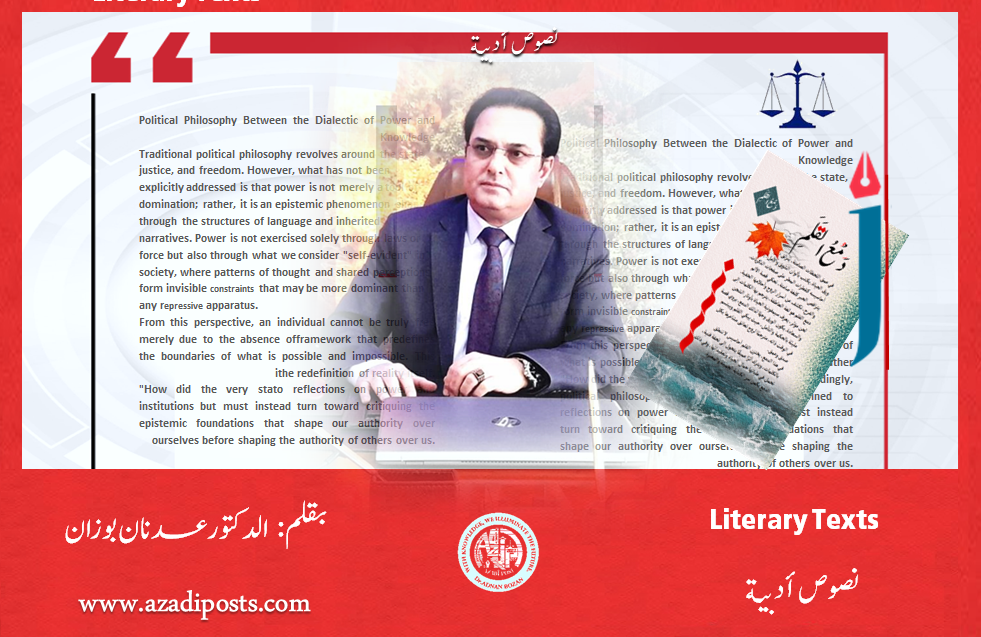
By Dr. Adnan Bozan
Life is not a mere passage over a bridge of days, but a series of intertwined stations between hope and defeat, between a sun that rises to announce the birth of a new day and a darkness that leans on the remains of corpses and ashes. It is an eternal battle between existence and nothingness, between survival and extinction—a battle carried by feet that insist on walking despite the bleeding, by chests that hold their breath despite the smell of gunpowder, and by eyes that keep searching for a distant spark called freedom.
In times of war, cities turn into fields of bewilderment, houses into faded ruins, and childhood into a question with no answer. There, where a mother’s warmth is replaced by the thunder of cannons, where loved ones depart as if the earth had expelled them all at once, another face of history emerges: a deformed face, where blood merchants prey on the body of societies, where sorcerers of ruin sow the seeds of hatred, turning blossoming spring gardens into desolate deserts, and crushing the smile of childhood as if it were a luxury unworthy of their dictionaries.
How many strugglers braved the raging winds and crossed seas and oceans—not to escape their homeland, but to carry it in their hearts to another place, searching for a life that preserves human dignity and offers future generations the chance to see a sun unstained by blood on their minarets! Yet, on the other side, how many wolves of our age insisted on reducing existence to ashes, turning human beings into numbers in the ledger of loss, and keeping nations suspended on barbed wires separating them from safe shores.
Ah, this treacherous age—an age of gunpowder that knows no mercy, an age of human caravans wandering the paths of migration like birds that lose their compass in a storm. On autumn nights, the apocalypse rose over our wounded cities, and the bells of danger tolled as if they were cosmic sirens, telling us that ruin was no longer a possibility, but an inevitable destiny.
On the 19th of September—the day Kobani bled—the crowds trembled in every direction: women carrying children as sacred trusts, men running without looking back, elders raising their eyes to the sky as if imploring it, and walls remaining as silent witnesses to everything, while people departed alone and in groups, leaving behind their childhoods, memories, and suspended dreams. Migration there was nothing less than the soul being torn from the body—forced, bloody, and inescapable.
We carried with us nothing but a perforated memory, scattered between the dust of books and the wrinkles of time, between old notebooks that spoke of schools now reduced to rubble, and songs once sung at weddings that today echo as cries of sorrow in exile. The question that burned our hearts was: Where are we heading? Is there a future awaiting us, or are we walking into another abyss disguised as salvation?
Feet pressed against barbed wires, children’s cries rose like death knells, and mothers’ tears poured down like rivers of salt. Yet we could not fully grasp the depth of the pain. It was enough to feel that we were migrating without return—that we were being uprooted like trees torn from their roots, cast into the unknown like leaves scattered by the wind.
The Kobani Exodus was not a passing incident, but a deep wound in our modern history—a landmark telling generations: here once was a city, here once was a people, here wings were broken, and birds migrated before their time. Caravans of people moved northward, toward the ice, toward lands that had never known the warmth of the East—leaving behind the only warmth they had ever known: the soil of their homeland.
And in exile, anguish dwelled within us as dust dwells in the lungs of a ruined city. There, the falseness of grand slogans was exposed, masks fell away, and the faces of lies and hypocrisy appeared. Nothing remained but a long estrangement, feeding on the endless wait for return. Some did return, when the invaders and preachers of darkness retreated—only to find their city as Gilgamesh once saw the corpse of Enkidu: ruins, corpses, and land that bore nothing but worms. Others went further north, seeking a new beginning.
As for me, I remained alone—a solitary figure in the autumn of dust and a fleeing life. I watched my city turn into a Wailing Wall, and the streets where we once laughed become a theater of tears. It was a shocking coincidence to be cast into this wandering, yet a coincidence that became destiny—embedding migration into our very bodies as an incurable disease.
Migration is not merely a geographical transition; it is an inner fracture, a struggle with the self, a journey from memory to the unknown. It is a surreal canvas painted with the blood of victims, with the tears of migrants, and with the merciless ink of history.
In this treacherous age, the voice of migrants will continue to echo across the world: we did not flee out of love for exile, but because war stole our homeland, forcing us to carry our graves upon our shoulders and march as if in a never-ending funeral. Yet, we will continue searching for a new sun—one that may rise one day over land untouched by gunpowder, over a homeland that does not sell its children or cast them out, over a life that grants human beings what they deserve: freedom and dignity.
Note: This article addresses the events of 2014, and was written in September 2015.


